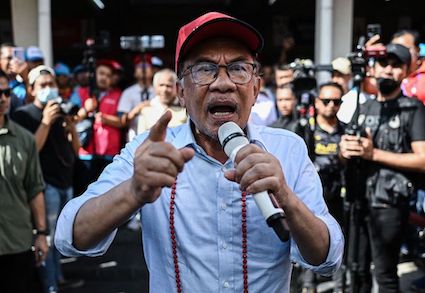Do opinion polls spell doom for Anwar and his government?

Dr Mahathir Mohamad, at the same stage in his career as prime minister, was more popular than Anwar Ibrahim is today.
Murray Hunter, FMT
In a Merdeka Center opinion poll, Prime Minister Anwar Ibrahim scored a 68% approval rating. Of that 68%, only 15% of respondents were very satisfied, while 53% were somewhat satisfied. Some 19% were either somewhat or very dissatisfied with Anwar, according to the poll.
In the same poll, the Anwar administration received an approval rating of only 54%, indicating the “unity government” coalition enjoyed only a very short honeymoon period, or didn’t have one at all, as the survey was taken from mid-December to mid-January.
More concerning was a recent O2 Malaysia survey based upon 25,077 respondents, where only 51% were satisfied with the new government. Only the non-Malay ethnic groups were in the majority with their satisfaction with the government’s performance, while only 15% of Malays were satisfied.
A massive 71% of Malays were dissatisfied with Anwar’s government.
This must be very concerning for the ruling coalition that will face six state elections within the next few months.
Poor prospects in state polls
Based upon these two surveys, where the O2 survey basically replicates the results of the last general election, the government coalition is set to perform very poorly in the coming state polls.
The DAP-led state government in Penang should retain power with 58% Chinese, and 64% Indian support, but may be set to lose seats in some mixed and Malay-majority seats.
Selangor could be a real cliffhanger
The recent budget proposals have placated the civil service with handouts. This will be very important in Selangor. However, there is little else in the budget to win votes, and ex-Umno divisional leader Noh Omar is set to pull a lot of support away from Umno.
Pakatan Harapan teaming up with Umno in Selangor could be a disaster in the state elections.
Of much more concern, according to the O2 Malaysia survey, is that Anwar himself is not even the most popular minister in his own government. That distinction goes to transport minister Loke Siew Fook with a satisfaction rating of 49%, which itself is still in the red. Loke’s incognito trips on the MRT seemed to raise his profile.
Anwar comes in second with 40% satisfaction, just ahead of youth and sports minister Hannah Yeoh at 39%, followed by local government development minister Nga Kor Ming at 34%. None of these ministers will be able to assist in increasing Malay support for the government coalition.
No real campaign stars
This suggests the government has no real stars who can go out on the hustings and win over voters in the Malay heartland at the state elections.
The only apparent wildcard the government may have in its favour is the quickly growing financial scandal emerging within Bersatu. A lot may depend upon how this scandal further rolls out over the coming couple of months.
However, the government has its own chinks in its armour, with the continuing trial of deputy prime minister Ahmad Zahid Hamidi on corruption charges and, ironically, the trial of Muda head Syed Saddiq Syed Abdul Rahman, who has attached himself to PH.
Anwar’s Malay conservative slant within his government over the past 90 days has dismally failed to win over Malay trust. It may also be alienating the non-Malay vote. Anwar’s government might be losing popularity incrementally.
Anwar, while trying to take up the mantle of prime minister, is failing to inspire the nation. Dr Mahathir Mohamad, at the same stage of his prime ministership, was more popular than Anwar is today. The lack of publicly perceived substance was only propped up by Loke’s ride on the MRT.
Anwar urgently needs to change direction. However, he lost a great opportunity to do so in the budget proposals he just handed down.
We also see a crevasse within the Cabinet, where ministers like Rafizi Ramli are being sidelined from the core leadership. Other ministers have been allowed to show their inexperience and even incompetence, which is creating a weak image around the Cabinet.
Effect of the green wave
The so-called “green wave” will not ebb at the state elections. Perikatan Nasional, under PAS’ leadership, will with little doubt consolidate their strength in Kelantan, Terengganu, and Kedah, and even Negeri Sembilan. This could leave PH with only Penang and Selangor.
This would change the whole dynamics of the body politics in the peninsula, where the “unity government” will have to play catch up. This sort of result could even strain its stability.
Anwar will have to undertake a makeover and take a completely different approach to the polarised political state that could be potentially created.
This new political dynamic may shift the tectonic plates of the peninsula to a situation where the state governments could gang up against the federal government. We would see this tectonic shift bring the balance of power in favour of the states, changing the nature of federal-state relations.
Finally, the polls highlight a lack of talent within the Cabinet that the rakyat can identify with. This chronic shortage of charismatic talent could cost the government dearly.
It will be necessary to change the composition of the Cabinet to save the government. This suggests ministerial appeal to the rakyat by individual members wasn’t given proper consideration, when the Cabinet was originally selected.

